摸得着的黑暗 Darkness That Can Be Felt
News
Slight changes to church website.
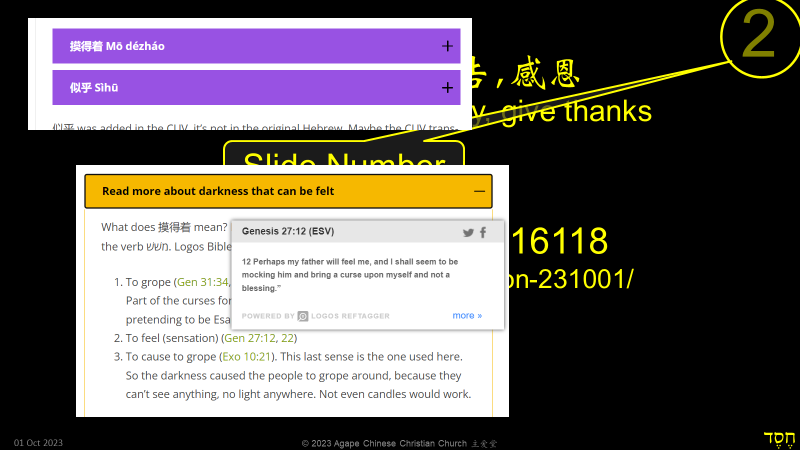

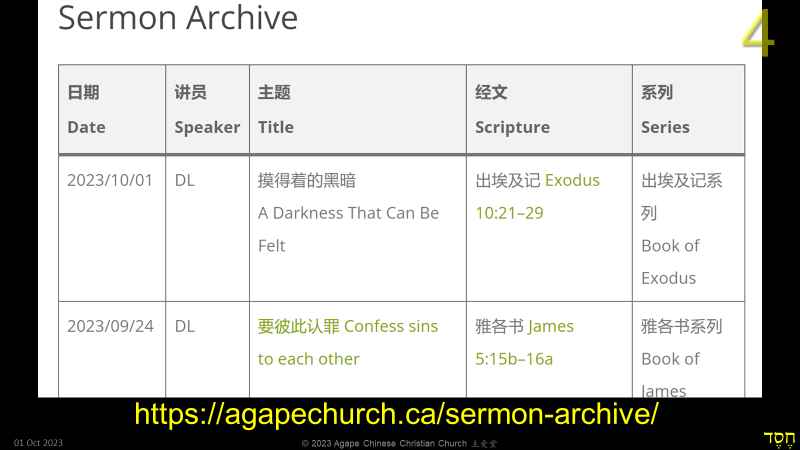
预演 Yùyǎn
预演 Yùyǎn
Preview. Like a movie preview.
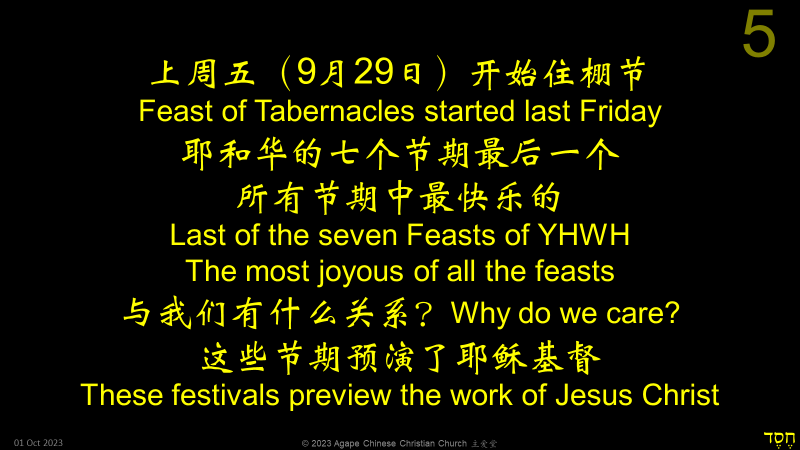
Last Friday (29 Oct) began the 8-day Feast of Tabernacles (Sukkot in Hebrew, the feast ends on Fri 6 Oct). It’s a reminder how Israel was living in tents in the wilderness after the Exodus.
What does this have to do with us? It’s a preview of God living with us for eternity (Rev 21:3). YHWH set up these feasts to remind the Jews year after year of God’s salvation plan.
Hook
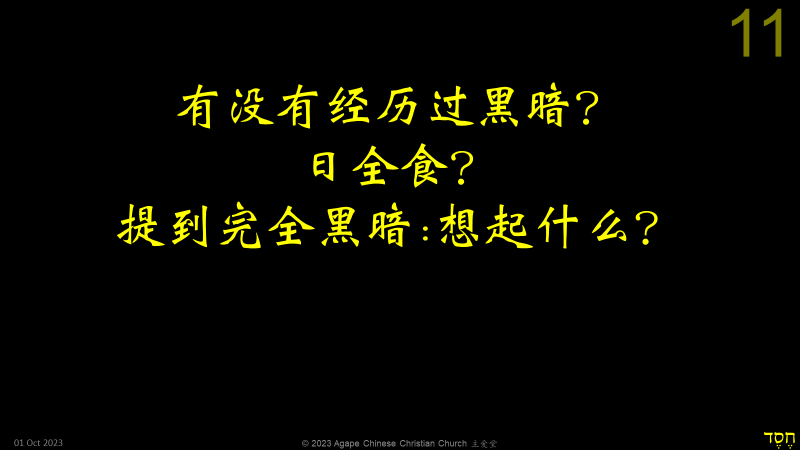
日全食 Rì quánshí
日全食 Rì quánshí
Lliterally “sun completely eaten.” Total solar eclipse.
Have you ever been in complete darkness, when there’s supposed to be light?
Ever experienced a total solar eclipse (日全食)? What did it feel like?
How about if even the stars are gone?
What comes to mind when you think of complete darkness?
Death! Hell! Imagine you’re in complete darkness, a darkness so intense that you can feel (not just symbolic, but physically feel). Imagine unseen creatures crawling over you, biting you, and you have no idea what they are. And this goes on and on and on…
Passage

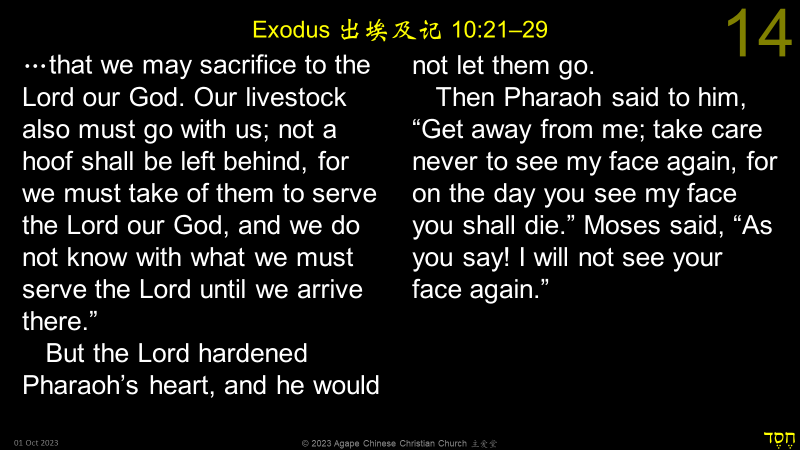

Exodus 10:21–29 ESV
Then the Lord said to Moses, “Stretch out your hand toward heaven, that there may be darkness over the land of Egypt, a darkness to be felt.”
So Moses stretched out his hand toward heaven, and there was pitch darkness in all the land of Egypt three days. They did not see one another, nor did anyone rise from his place for three days, but all the people of Israel had light where they lived.
Then Pharaoh called Moses and said, “Go, serve the Lord; your little ones also may go with you; only let your flocks and your herds remain behind.” But Moses said, “You must also let us have sacrifices and burnt offerings, that we may sacrifice to the Lord our God. Our livestock also must go with us; not a hoof shall be left behind, for we must take of them to serve the Lord our God, and we do not know with what we must serve the Lord until we arrive there.”
But the Lord hardened Pharaoh’s heart, and he would not let them go.
Then Pharaoh said to him, “Get away from me; take care never to see my face again, for on the day you see my face you shall die.” Moses said, “As you say! I will not see your face again.”
Outline

谈判 Tánpàn
谈判 Tánpàn
Negotiations.
威胁 Wēixié
威胁 Wēixié
Threaten. Make a threat.
Section 1 灾难 The Plague
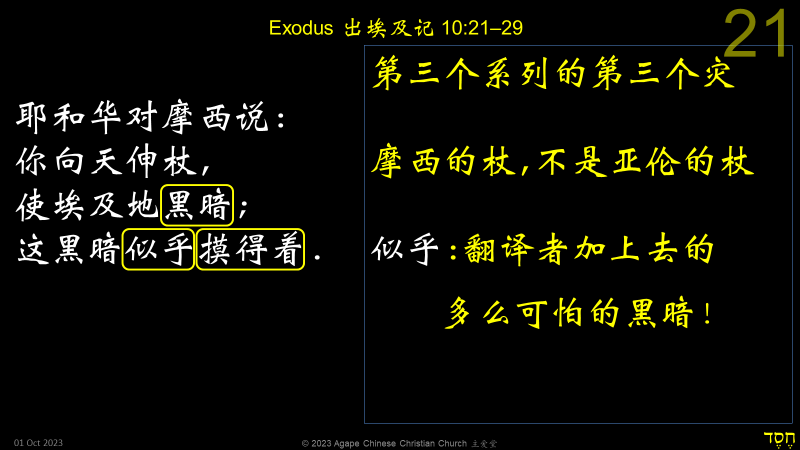
Exodus 10:21 ESV
Then the Lord said to Moses, “Stretch out your hand toward heaven, that there may be darkness over the land of Egypt, a darkness to be felt.”
The 3rd plague in the 3rd series (3 series of 3 plagues each, total of 9 plagues). Only one plague left.
Note it’s Moses’ staff, not Aaron’s staff. Aaron’s staff was used in the 1st series. The 2nd series didn’t mention any staffs, and the final series is all Moses’ staff. Aaron was God’s spokesman at the beginning (because Moses kept finding excuses not to do what God asked). Moses is now slowly taking over as the leader used by God. By the time they leave Egypt, Moses will be the leader of the Israelites, while Aaron’s role became secondary (he became high priest).
摸得着 Mō dézháo
摸得着 Mō dézháo
Can be touched.
似乎 Sìhū
似乎 Sìhū
“Seems,” here 似乎摸得着 means “seems to be touchable.”
似乎 was added in the CUV, it’s not in the original Hebrew. Maybe the CUV translators thought it’s didn’t make sense that you can feel darkness. In all English translations, it says directly that “the darkness can be felt,” there’s no “seems.”
Read more about darkness that can be felt
What does 摸得着 mean? How can we touch darkness? 摸得着 translates the verb משׁשׁ. Logos Bible Word Study shows 3 senses of this verb:
- To grope (Gen 31:34, 37 Laban searching Rachel’s stuff; Deut 28:29 Part of the curses for covenant disobedience; Job 5:14; 12:25 Jacob pretending to be Esau)
- To feel (sensation) (Gen 27:12, 22)
- To cause to grope (Exo 10:21). This last sense is the one used here. So the darkness caused the people to grope around, because they can’t see anything, no light anywhere. Not even candles would work.
We usually think of darkness as not a thing on its own; darkness is just the absence of light. But, what if there is darkness that isn’t just the absence of light? What if this type of darkness is physical, like particles of light? Absence of light is bad enough, but with particles that are “darkness” that can be felt?
Lessons
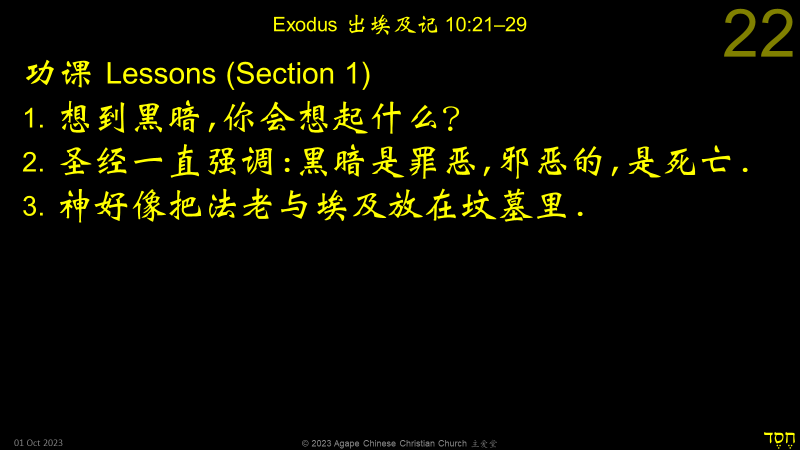
- What do you think of when you hear darkness
- The Bible always emphasied that darkness is sin, evil, death.
- It’s like God is bringing Egypt into the grave.
Section 2 无用的假神 Useless gods

Exodus 10:22–23 ESV
So Moses stretched out his hand toward heaven, and there was pitch darkness in all the land of Egypt three days. They did not see one another, nor did anyone rise from his place for three days, but all the people of Israel had light where they lived.
Note that YHWH commands, and Moses follows. As opposed to Pharaoh who kept arguing and never wanted to obey.
乌黑 Wūhēi
乌黑 Wūhēi
The two words are literally “dark black.” It’s an expression for something like “pitch darkness,” “total darkness,” or “absolute darkness.”
Some Chinese supermarkets sell a type of chicken called 乌鸡 Wūjī, literally “dark chicken.” The skin is almost black, looks rather strange!
CUV has better translation here: “dark black,” translating the Hebrew “dark darkness.”
Three days in complete darkness, no sun, no moon, no stars, not even a candle will work. People can’t move from wherever they are (this is like they were dead).
God protects Israel, his chosen people (his firstborn, Exo 4:22–23).
Concerning “three days”
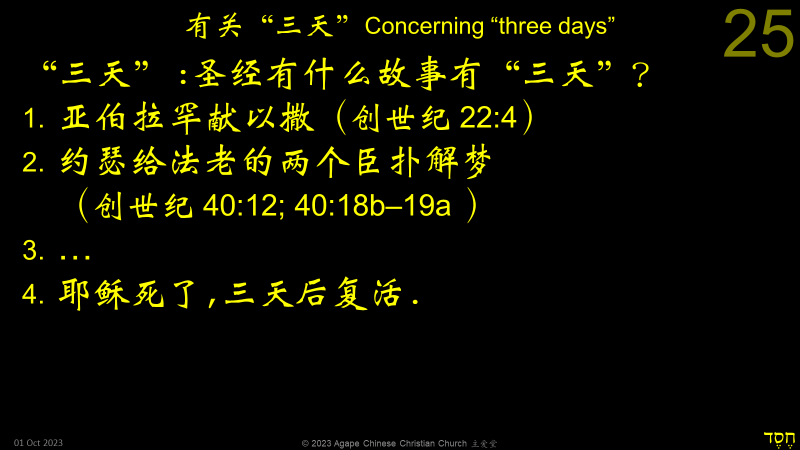
What stories from the Bible mention “three days”?
- Abraham sacrificing Isaac (Gen 22:4).
- Joseph (while in prison) interpreting the dreams of Pharaoh’s two servants (Gen 40:12; Gen 40:18b–19a).
- …
- Jesus died, and was resurrected three days later.
The false gods of Egypt

Horus

One of the most significant ancient Egyptian deities who served many functions, most notably as god of kingship, healing, protection, the sun and the sky.
The god of sunrise.
Aten

The Aten was the disc of the sun and originally an aspect of Ra, the sun god in traditional ancient Egyptian religion.
The god of the round, midday sun.
Atum

Atum, sometimes rendered as Atem or Tem, is the primordial god in Egyptian mythology from whom all else arose. He created himself and is the father of Shu and Tefnut, the divine couple, who are the ancestors of the other Egyptian deities. Atum is also closely associated with the evening sun, the god of sunset.
Ra

One of the most important gods in ancient Egyptian religion, identified primarily with the noon-day sun. Ra ruled in all parts of the created world: the sky, the earth, and the underworld. He was believed to have ruled as the first pharaoh of Ancient Egypt. He was the god of the sun, order, kings and the sky.
Lessons

Section 3 谈判 Negotiations




燔祭牲 Fánjì shēng
燔祭牲 Fánjì shēng
“Whole burnt offering”. 牲 means sacrifice in general. Another commonly used term is 牺牲 Xīshēng, which also translates to sacrifice.
蹄 Tí
蹄 Tí
Hoof of an animal. In this sentence, Moses said 连一蹄也不留下 (“Not one hoof is to be left behind”), meaning that everything must leave, including every animal. To read more about the significance of burnt offerings, you can read this article: Favor by Fire: Burnt Offerings and the Bible
妥协 Tuǒxié
妥协 Tuǒxié
Compromise. 摩西不肯 Bù kěn 妥协 Moses refuses to compromise.
Lessons

Section 4 神使法老心刚硬吗?God hardened Pharaoh’s heart?

刚硬 Gāng yìng
刚硬 Gāng yìng
Hard, unyielding, unchanging.
强迫 Qiǎngpò
强迫 Qiǎngpò
To coerce someone or something. The two Chinese words literally mean “strong coercing,” or “strong forcing.”
What does “hardened his heart” mean?
Did God forced Pharaoh to obey him? Did God force Pharaoh to disobey him, then turn around an punish him for disobedience? NO!
Don’t make the mistake of thinking that God forced Pharaoh to obey him (hardening his heart).
Pharaoh always had a choice. He heard the demands of God, an saw the miracles that God performed, but he refuses to change his mind. So about half-way through the plagues, God just made Pharaoh even more resolute, so that Pharaoh is only following his own will of disobeying God.
God didn’t force Pharaoh to disobey him.
Lessons

Section 5 威胁 The threat

威胁 Wēixié
威胁 Wēixié
To threaten someone. A threat.
Lessons

Final Lessons

- The Bible tells us who God is.
- Salvation and new-creation are intimately related.
- These plagues seems to be taking Egypt back to the primordial chaos before the Creation.
- Jesus also showed us that all Creation is under his sovereignty. He let’s us know that he is God.
- Quite often, even though we know who God is, and know his demands, we refuse to obey.
We want to be our own gods.
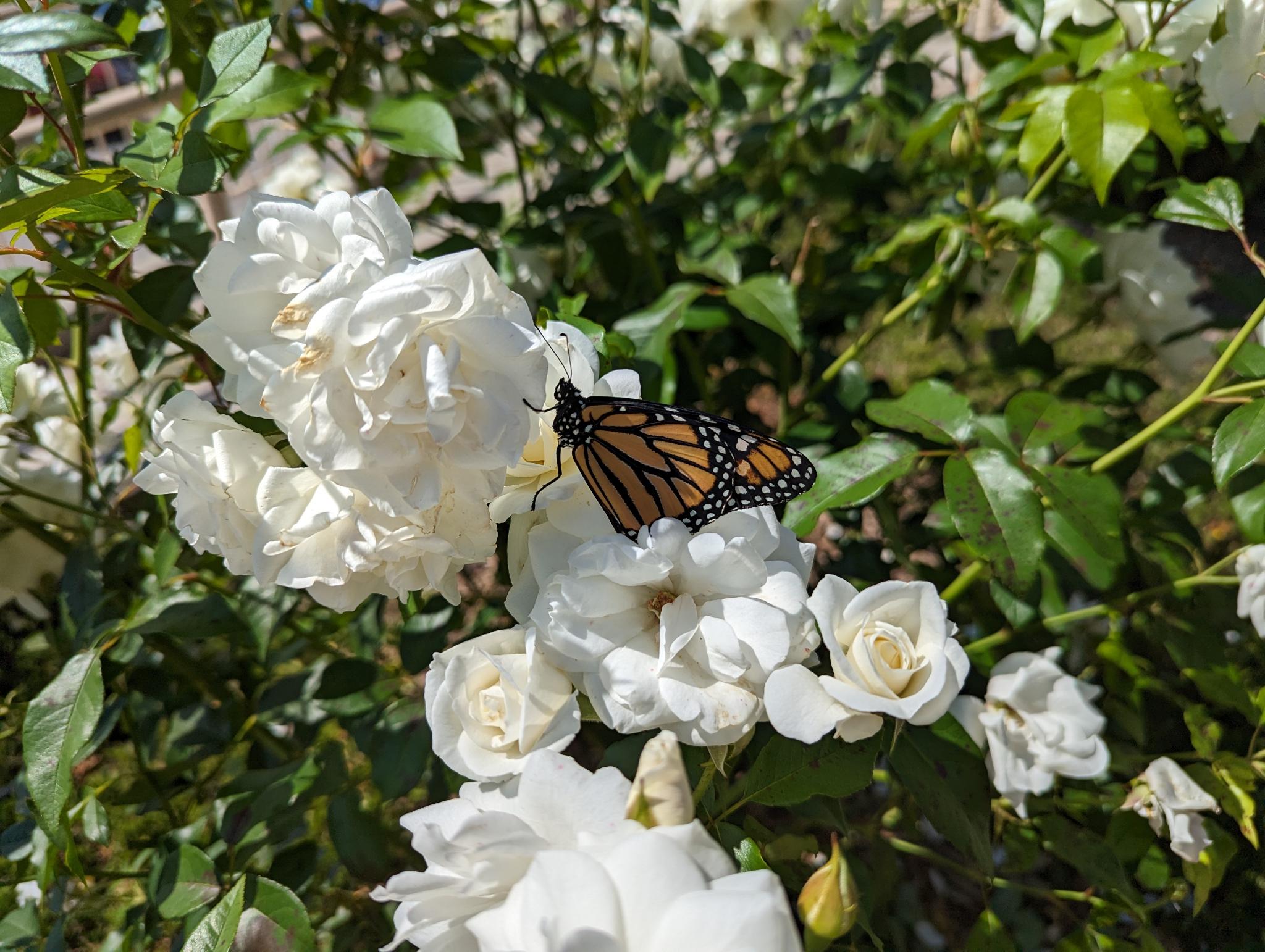

Leave a Reply